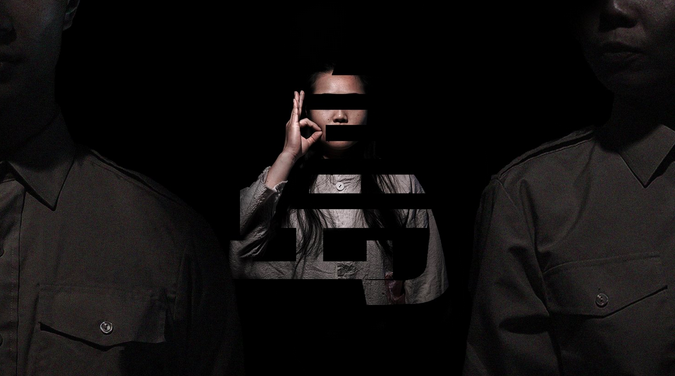
[If you gaze into the abyss, the abyss gazes also into you]
Described as an immersive experience to ‘journey through time, bearing witness to a Taiwanese perspective on legacies of colonialism (1930-1995)’, This Room is an Island sets the stage outside the theatre, beginning in the Te Pou foyer.
One by one performers make their way through the audience to the middle of the floor. People instinctively part to make space, the audience pushed against the walls by some invisible force. Standing next to the recycle bin I try to make myself small and out of the way — I feel like the intruder here.
In the foyer-turned-stage there are two collectives present. The first, dressed in patchwork jackets made from rice sacks, remove their clothes, leaving them neatly folded in piles as they kneel in their underwear. The second are dressed in all-black security jumpsuits, appearing faceless with black material covering their heads, standing upright at attention — it’s very clear who is in charge.
Officers kick over the folded clothes, ordering those kneeling to redo it again, before they are commanded to change into new, Japanese style uniforms. Considering the abstract and immersive nature of the rest of the show, the preshow serves as an effective primer, setting up the power dynamic that influences the decisions of the audience throughout the performance.
The first choice in this choose-your-own-adventure is to decide whether to be an Imperial Spectator or a Body of the Island. It creates the illusion of choosing to be a bystander to the gruelling oppression just witnessed, or to participate in the experience.
I hang back with the remaining crowd who will become bodies of the island. When it comes time to enter the theatre we line up in single file to be inspected by the officers before entry. I am asked “what is your name?” while others behind are pulled aside for failing to correctly answer “where are you from originally?”.
An officer then directs me to the row of people seated on the floor, while the Imperial Spectators look down from above in their chairs. Sound reverberates through the theatre as images are projected on the back wall. My position, crossed legged on the floor adjacent to two stage lights, means it’s hard to see with clarity what is actually being projected. I am unsure if it was done intentionally to disorient the audience and let idle minds panic, amidst all the noise and visuals I find myself sitting there, [temporarily] unengaged with what’s happening around me.
When the performers return to the stage, I am much more immersed as the rest of the act unfolds. Each scene becomes a poignant snapshot of Taiwan’s emotional and historical journey. What stands out is the way the dancers express a spectrum of experiences from passive oppression to the fight for freedom. Sometimes, they move in unison with uncanny puppet-like motions, seemingly controlled by external forces. Other times, movements are filled with angst, the variation between dancers showcasing a fight for identity. The continued soundscape throughout creates a seamless atmosphere as performance flows across time and generations, captivating and transporting the audience with its multifaceted storytelling.
Perhaps I should be grateful for the earlier reprieve, as in Act Two, the officers return with stern orders for us to rise and move forward. Being on stage, I not only hear, but also feel the forceful stomps of the officers’ shoes through the floor.
As the stage walls open up, we are ordered forward and separated into groups. Voiced-over instructions echo through the space, urging us to comply with the dancers who now direct us to dance. Officers shout ‘You must comply,’ and surreally, participating audience members begin to dance.
I strive to keep up, but my feigned enthusiasm is inadequate as an officer calls me out for non-compliance. When asked why I am there, I respond honestly, ‘I am here to review the show,’ knowing that I have nothing to fear from the truth.
I’m escorted to the top of the stalls, positioned above the imperial guests, and ordered to face a camera. I comply, turning to capture both my left and right profiles as if in a prison mug shot. To my surprise, my face is projected onto the back wall, looming over the participants who dance in unison with their instructors—an ominous reminder of the consequences for non-compliance. Meanwhile, the Imperial Spectators observe both the obedient participants and those called out, serving as a subtle commentary on the dangers of remaining silent.
More non-compliers are lined up behind me as I am escorted again by an officer, this time led to the theatre side for interrogation.
‘Who is the Spy?’ an officer barks at me.
‘I am the spy,’ I answer sarcastically.
I generally dislike being questioned or told what to do. I am unsure if it is misplaced sass or a default reaction to authority, but under the stern gazes of the officers, I find myself giggling. The officers move on to the next person in line, leaving me standing against the wall and feeling embarrassed by my cheeky and ill-mannered responses in the solemn atmosphere.
‘This Room is an Island’ is a confronting performance, reflecting both historical and emotional aspects of colonisation, nationalism, and corruption. By immersing the audience in history rather than presenting it as fact it invokes more than just empathy, inviting the audience to discover truths about themselves.
During the performance I am both figuratively and literally projected onto the stage — and I’m not sure I like what I find. If I take away anything from this show, it’s that the ability to empathise is not enough. It required intent to acknowledge how much my experience growing up in Aotearoa as a NZ European shaped both my experience of ‘This Room is an Island’ and my perception of the world.
No one is just a body on the island. What you bring to the show will shape your experience. It is up to the individual audience members to decide what that narrative is, and what they will take from it.
This Room is an Island played Te Pou Theatre 2-4th of February 2024



Leave a Reply